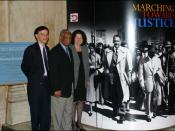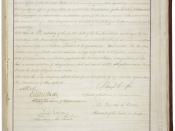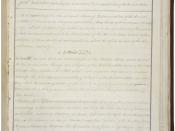The Nineteenth Amendment was a great victory for women, which had been in the works for decades before its ratification. This amendment says that, "The right of citizens of the United States to vote shall not be denied or abridged by the United States or by any State on account of sex." Surprisingly, this amendment was not ratified until August 18, 1920. (Find Law 1) It took years of struggle and protest before women achieved the right to vote, a right that men have possessed since the beginning of our nation.
The beginning of the women's rights movement can be traced all the way back to 1848, where the first women's rights convention was held in Seneca Falls, NY. Under the guidance of feminist Elizabeth Cady Stanton, they produced the Declaration of Sentiments, which protested the political, social, and economic inferiority of women. Four years later, the women's rights activists gained the much-needed support of Susan B.
Anthony. At a convention in 1852, Anthony spoke out against the injustices that women were facing and said that, "The right women need above every other...is the right of suffrage." Anthony would prove to be a great leader in this movement.
On June 13th 1866, Congress passed the Fourteenth Amendment, which dealt with rights of citizens in the United States. Upon its ratification in July of 1868, some questions began to arise about the conditions of this new law. The new amendment stated that, "All persons born or naturalized in the United States, and subject to the jurisdiction thereof, are citizens of the United States and of the State wherein they reside. No State shall make or enforce any law which shall abridge the privileges or immunities of citizens of the United States." Women interpreted this to mean that since they were considered...



Great Essay
You bring up many facts that help support your reason why that Amendment was significant. Very good essay
1 out of 1 people found this comment useful.